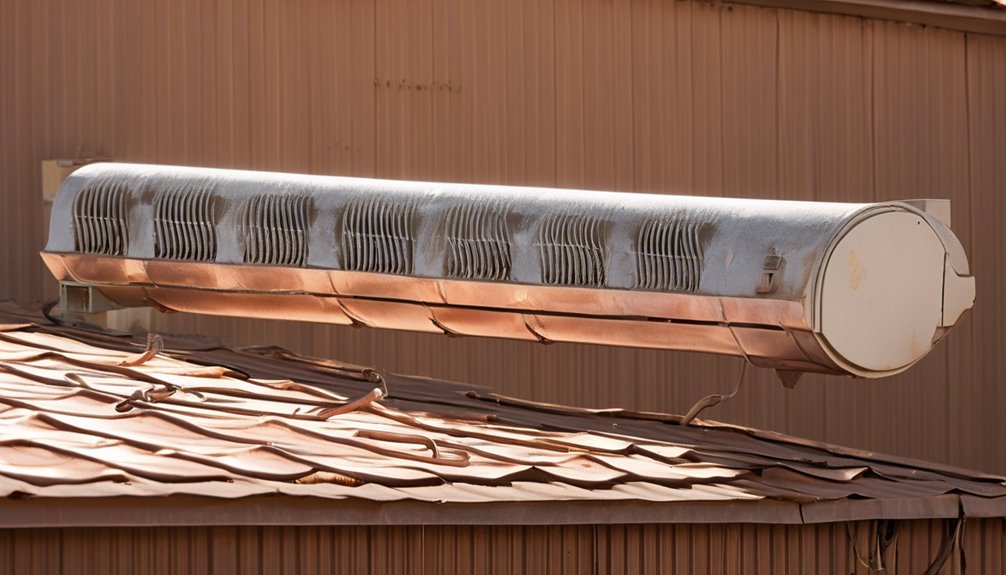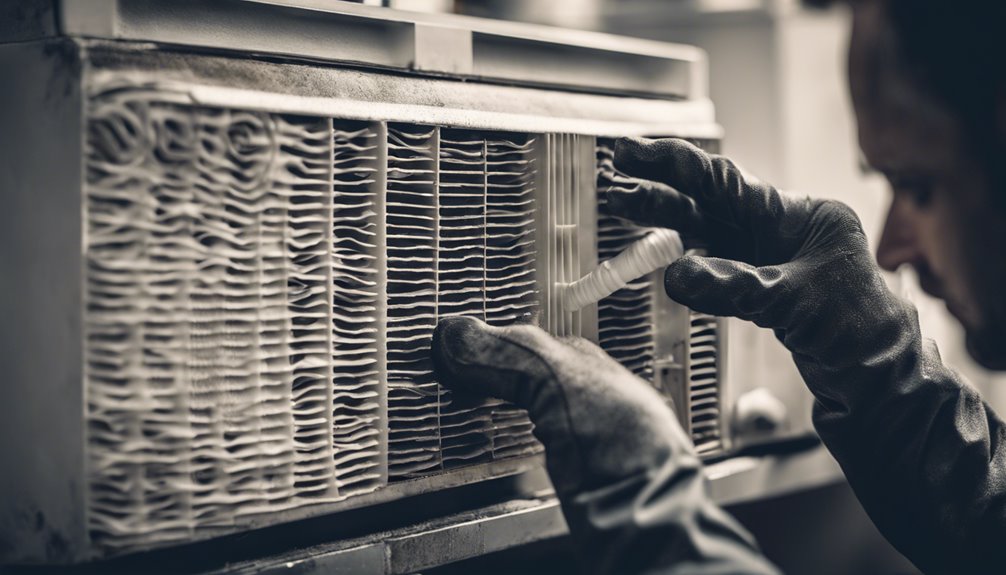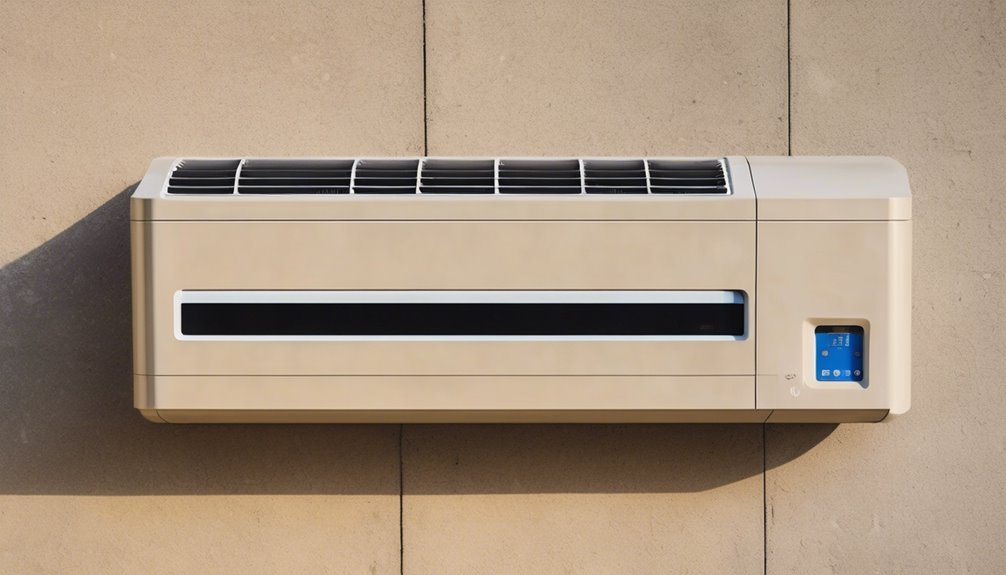When your air conditioner's refrigerant levels dip, you'll notice a significant drop in airflow and cooling capacity, making your home feel stuffy and uncomfortable. Your energy bills will skyrocket as the AC works harder to cool the air, but with little success. You might hear unusual noises and vibrations, or spot frost or ice buildup on coils and pipes. Warm air will flow from vents, and humidity and moisture issues can lead to mold and water damage. If you're experiencing these signs, it's likely your AC's gas levels are low, and it's time to investigate further to prevent more severe consequences.
Key Takeaways
- Low AC gas levels reduce airflow and cooling capacity, causing temperature fluctuations and warm air from vents.
- The AC works harder, leading to increased energy consumption, higher bills, and premature wear and tear on the system.
- Unusual noises and vibrations, such as hissing or gurgling sounds, can indicate refrigerant leaks and system malfunction.
- Visible signs of low AC gas include frost or ice buildup on coils and pipes, and weak or intermittent airflow.
- Ignoring low AC gas levels can lead to electrical complications, heatwave-related issues, and costly repairs or system replacement.
Reduced Airflow and Cooling Capacity
When your air conditioner's gas levels drop, you'll likely notice a significant decrease in airflow and cooling capacity.
This reduction in performance can lead to discomfort and frustration, especially during hot summer months. One of the main reasons for this decrease is low air pressure, which affects the AC's ability to circulate cool air throughout your home.
Low air pressure reduces AC performance, leading to discomfort and frustration, especially during hot summer months.
Ventilation issues can also arise, causing the air to become stale and stagnant. As a result, you may notice that your AC is working harder to cool your home, but with little success.
It's essential to address these issues promptly to ensure your AC operates efficiently and effectively.
Increased Energy Consumption and Bills
As you're running your AC more frequently to compensate for the lack of cooling, you're likely to notice a spike in your monthly energy expenses.
Your system takes longer to cool your space, which means it's working harder and using more power. This increased energy consumption won't only burn a hole in your pocket but also reduce the overall efficiency of your system.
Higher Monthly Expenses
Your wallet takes a hit when your air conditioner is running low on refrigerant.
Low AC gas levels cause your air conditioner to work harder, leading to increased energy consumption and higher monthly bills. This can be a significant financial burden, especially for those living on a tight budget.
Some of the ways low AC gas levels can affect your budget include:
- Increased energy costs: Your air conditioner uses more power to cool your home, leading to higher electricity bills.
- Overtime wear and tear: The added strain on your AC system can lead to premature wear and tear, resulting in costly repairs or even replacement.
- Budget concerns: Higher monthly expenses can cause financial stress and make it difficult to allocate funds to other important areas.
Increased Cooling Time
A sluggish air conditioner is a clear indication of low AC gas levels, and it's not just about the comfort level in your home.
You're likely to experience increased cooling time, which means your AC takes longer to cool your space. This can be frustrating, especially during summer delays when you need relief from the heat.
As a result, you'll notice your energy bills skyrocketing. You're not only paying more, but you're also waiting longer for your home to cool down.
This cooling struggle is a sign that your AC is working harder to compensate for the low gas levels, leading to increased energy consumption and bills.
Reduced System Efficiency
Prolonged cooling times are just the beginning – low AC gas levels also reduce your system's overall efficiency.
As a result, you'll notice your energy consumption and bills increasing. This is because your AC system has to work harder to cool your space, which negatively impacts system performance.
- Your AC's optimal operation is compromised, leading to a decrease in its ability to cool your space effectively.
- You'll experience higher energy bills due to the increased power required to operate your AC.
- The overall lifespan of your AC system may be shortened, as it's forced to work harder than usual.
Unusual Noises and Vibrations
When your air conditioner is running low on refrigerant, it can produce unusual noises and vibrations that are often loud enough to be distracting.
You might hear hissing, bubbling, or gurgling sounds, which can indicate gas leaks in the system. These leaks can cause the compressor and other components to vibrate excessively, leading to unusual noises.
A vibrational analysis can help identify the source of the problem. If you notice these unusual noises and vibrations, it's essential to have your AC unit inspected and serviced promptly.
Ignoring these symptoms can lead to more severe damage, increased energy bills, and even system failure.
Frost or Ice Buildup on Coils and Pipes
Your air conditioner's coils and pipes are usually clean and free of obstructions, but when the refrigerant level drops, you might notice frost or ice forming on them.
This is a clear indication that your AC's gas levels are low. As the refrigerant struggles to cool the air, it can't absorb heat properly, causing the moisture in the air to freeze.
This buildup can lead to further complications if left unchecked.
- You'll need to perform a coil inspection to ensure there are no blockages or dirt accumulation that might be exacerbating the issue.
- Regular pipe maintenance is crucial to prevent corrosion and damage.
- Don't hesitate to call a professional if you're unsure about how to proceed with the repairs.
Warm Airflow From Vents
Airflow that's warmer than usual from your vents is a telltale sign of low AC gas. You might notice that your home isn't cooling down as quickly as it should, or that the air coming out of your vents feels lukewarm. This can be uncomfortable, especially during hot summer months. Low AC gas levels can lead to ventilation issues, which can negatively impact your indoor air quality.
| Symptom | Impact |
|---|---|
| Warm airflow | Uncomfortable living space |
| Reduced cooling | Increased energy bills |
| Poor ventilation | Poor indoor air quality |
| Inadequate cooling | Heat-related health issues |
| Inefficient system | Premature system failure |
If you're experiencing warm airflow from your vents, it's essential to have your AC system checked and serviced to prevent further damage. Schedule an air quality check to ensure your indoor air is safe and healthy to breathe.
Humidity and Moisture Issues
As you're dealing with warm airflow from your vents, you might also notice that your home is struggling to regulate its humidity levels.
This can lead to a buildup of moisture, causing issues throughout your home.
- Mold formation can occur on walls, ceilings, and furniture, creating an unhealthy environment and unpleasant odors.
- Water damage can appear on walls, floors, and ceilings, requiring costly repairs and potentially leading to structural issues.
- You might notice condensation on windows and doors, which can lead to further moisture problems if left unchecked.
It's essential to address these humidity and moisture issues promptly to prevent long-term damage and maintain a comfortable living space.
Weak or Intermittent Airflow
Most homes rely on a consistent stream of cool air to keep their living spaces comfortable, but when that flow is weak or intermittent, it's a clear sign that something's amiss.
You might notice that air circulation is poor, and your vents aren't blowing air as strongly as they should. This can lead to ventilation issues, making your home feel stuffy and uncomfortable.
Weak airflow can also cause your AC to work harder, leading to increased energy bills. If you're experiencing weak or intermittent airflow, it's likely that your AC's gas levels are running low.
It's essential to address this issue promptly to prevent further damage to your unit and ensure your home remains comfortable and cool.
Overheating and Tripped Circuit Breakers
When you notice your AC is running hotter than usual, with high temperature readings on your thermostat, it may be a sign of low AC gas.
This overheating can cause your circuit breaker to trip frequently, leaving you without cool air and dealing with the hassle of constant resets. You're likely to experience these issues more often if the problem isn't addressed.
High Temperature Readings
How often have you noticed your air conditioner's temperature readings skyrocketing, leaving you sweating and miserable?
This can be a sign of low AC gas levels. When the refrigerant is low, the system struggles to cool the air, leading to temperature fluctuations.
During heatwaves, this can be particularly problematic, as the AC is working overtime to keep your home cool.
Some common signs of high temperature readings include:
- The temperature display on your thermostat rising rapidly
- Your AC running continuously without providing adequate cooling
- The air coming from the vents feeling warm or lukewarm
Frequent Breaker Trips
Your air conditioner's breaker trips frequently, leaving you without cooling and wondering what's going on.
This issue is more than just an inconvenience – it's a sign of a deeper problem. When your AC's compressor and fan motor draw more power than usual, it can cause a circuit overload.
This, in turn, triggers the circuit breaker to trip, cutting off power to the unit. An electrical surge or a malfunctioning component can also be the culprit.
If you're experiencing frequent breaker trips, it's essential to investigate the cause. Low AC gas levels could be the root of the problem, putting your system at risk of further damage.
Frequently Asked Questions
Can Low AC Gas Levels Cause Mold Growth in My Air Ducts?
You're wondering if low AC gas levels can cause mold growth in your air ducts. Yes, they can! When your AC struggles, duct humidity rises, and poor air quality sets in, creating a perfect environment for mold to thrive.
Will a Refrigerant Leak Affect My Ac's Dehumidifying Function?
You'll notice a drop in cooling capacity if a refrigerant leak affects your AC's system performance, making it harder to remove humidity from the air, which can lead to a less comfortable indoor environment.
Can I Recharge My Ac's Gas Levels Myself?
You're considering a DIY recharge, but be aware that attempting to refill your AC's gas levels yourself can pose significant safety risks, including explosion and injury, so it's highly recommended to leave it to a professional.
How Often Should I Check My Ac's Gas Levels?
You should check your AC's gas levels regularly as part of routine maintenance, ideally during seasonal checks, to ensure optimal performance and prevent issues, rather than waiting for problems to arise.
Will Low AC Gas Levels Void My Air Conditioner's Warranty?
You're wondering if low AC gas levels will void your air conditioner's warranty. Check your warranty terms, as manufacturer guidelines typically outline what's covered and what's not. Failure to maintain proper gas levels might negate warranty coverage.
Conclusion
You've noticed your AC isn't performing as it should, and you're wondering what's going on. It's likely due to low AC gas levels. If you've experienced reduced airflow, increased energy bills, unusual noises, or frost on coils and pipes, it's time to take action. Don't wait until your system breaks down completely. Get your AC serviced to top off the gas and get your cool air flowing again. Ignoring the problem will only lead to more costly repairs and discomfort in your home.



